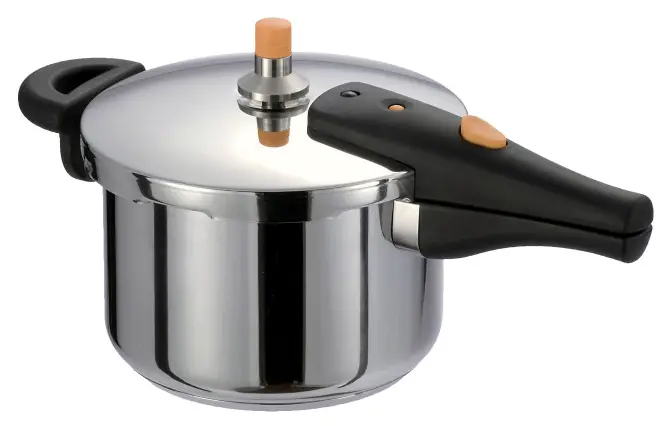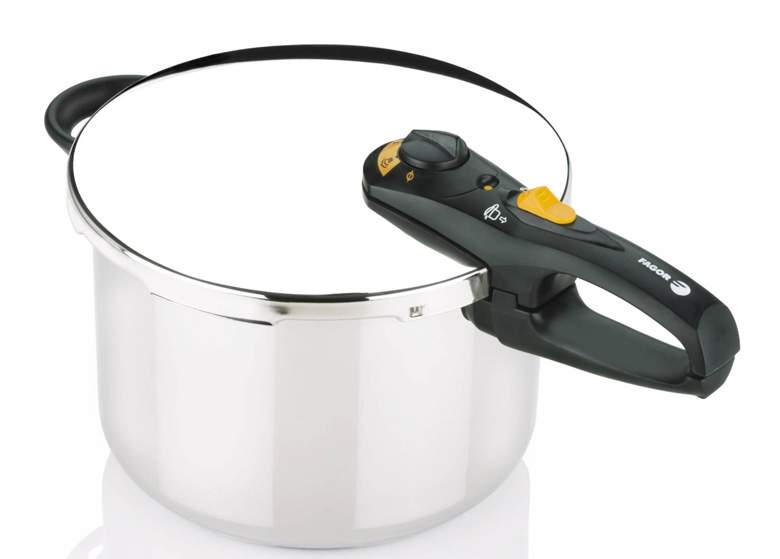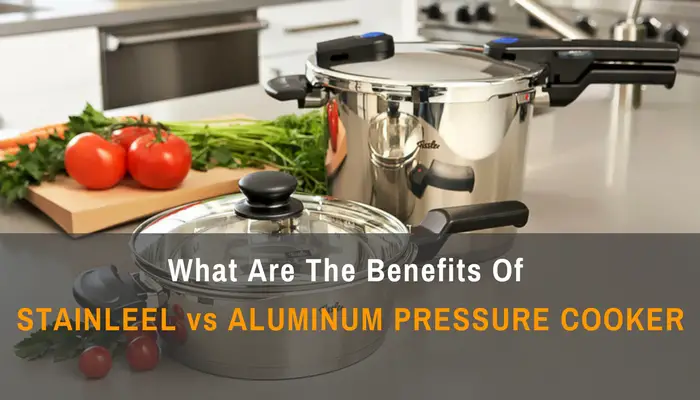Stainless Steel vs. Aluminum Pressure Cooker: Which One Is Better?
The Ultimate Showdown: Aluminum Pressure Cookers vs Stainless Steel Pressure Cookers - Which One is Better?
There are two predominant types of pressure cookers in the market: stainless steel and aluminum. Each has its own advantages and disadvantages, but one remains to be more suitable to a certain set of people with different needs and preferences. It means that one is better than the other depending on the person using it and her specific cooking standards. To give you a clearer comparison, here is a detailed account of stainless steel vs aluminum pressure cooker.
Stainless Steel Pressure Cooker

Soure: zolonproducts.co.in
Pros:
- Heavy-duty material: It is thick, so it is certain to outlast its aluminum counterpart by years. Even when used often, it does not get any significant damages from the heat and repeated cleaning.
- Easy to clean: As the term implies, stainless steel does not get scratches, stains and rust easily. Because of that, fast and simple cleaning often suffices.
- Resistant to scratch, stain and corrosion: Even when accidentally used with a sharp ladle, abrasive cleaning solution, rough cleaning cloth, or acidic ingredient, it is guaranteed to stay strong and damage-free for the longest time.
- Less prone to producing food burns: As the material does not absorb and distribute heat easily, it is less prone to burning foods even when unintentionally forgotten or overcooked. This is definitely the perfect kitchenware for people who are still on their way to learning cooking.
- Longer-lasting brand-new finish: With proper maintenance, you are guaranteed to still see your face on its shiny surface years after its first use. Stainless steel pressure cookers remain elegant despite heavy and regular use.
Cons:
- More expensive: As you would expect from a material that is longer-lasting, the price is also unsurprisingly higher. The price of a stainless steel pressure cooker oftentimes reaches 50% to 100% of what you would pay for an aluminum one. The extra price is worth every cent though, as what you have learned from the advantages above.
- Heavier built: Although heavier built means more durable material, the weight can pose big problems for some people, especially if they need to remove the entire pressure cooker from the stovetop. When not handled properly, it can lead to accidents and not just wasted foods scattered on the floor. The brand you want to buy should have a strong handle to prevent accidents.
- Less effective as a heat conductor: This can be translated to longer cooking hours because the heat distribution in the pressure cooker does not spread evenly as fast as it would with aluminum. You have to put the temperature on high to get the heat that you need at the shortest possible time
In some cases, this leads to uneven cooking, especially if the food is not properly placed on the pan. Many brands of stainless steel pressure cookers put copper under the lid to compensate for this.
- Longer heat retention: There is really no problem with it for as long as you constantly pay attention while cooking. Longer heat retention only means that your food tends to be overcooked when not removed from the pressure cooker as soon as done. This is because stainless steel traps heat more effectively than aluminum. Those who are not familiar in using it might have saggy vegetables and dry meat for dinner.
Nonetheless, with proper cooking skills, stainless steel pressure cookers can be used to ironically slow cook some meals for better finish without risking food burn.
Aluminum Pressure Cooker

Soure: heavy.com
Pros:
- Inexpensive: The price often decides who wins between stainless steel vs aluminum pressure cooker. Who does not want an effective cooking companion for almost half the price anyway? This is the perfect choice if you want to experience pressure cooking but on a tight budget.
- Light to carry: Petite moms will definitely find this lightweight material convenient not only when transferring from place to place but also when cleaning. It is easy to carry even when full.
- Very effective heat conductor: Aluminum is one of the most effective heat conductors among all the metals. This means that food is cooked faster and the heat is distributed more evenly, also resulting to more even cooking of all sides.
- Ideal for large-volume cooking: Most industrial-type pressure cookers, especially those used for canning, are really made of aluminum because of its effectiveness in distributing heat and its lightweight build.
Cons:
- Shorter lifespan: As you would expect from a thinner material, the lifespan is also expected not to last very long. It is prone to damage when not cleaned and used properly. You may want to take sharp objects away from it.
- Warps easily: It is not rare for an aluminum pressure cooker to warp over time because of its thinner material. It can also be a big problem if you often carry it with heavy food inside.
- Prone to scratching, staining, and rusting: Unfortunately, even with careful cleaning and usage, it is bound to get damages over time. There is nothing you can do about it.
- Prone to burning food: It cooks food faster, yes. However, when the one using it does not pay attention, there is a big chance of serving burnt food afterwards, especially if some parts of the food stick to the bottom surface.
To decide which one wins the stainless steel vs aluminum pressure cooker battle, here is a brief comparison between the two products.
- Cost: Aluminum is definitely more affordable, but stainless steel is more expensive for a reason.
- Durability: Stainless steel is meant to last for years even with regular use, while aluminum may not last long.
- Maintenance: Overall, both are easy to maintain, but stainless steel is undoubtedly easier to clean.
- Function: Aluminum is a more effective cookware, but stainless steel does not lag far behind (especially if you know how to use it).
- Output: While an aluminum pressure cooker cooks faster, it is generally accepted that a stainless steel pressure cooker produces higher quality food.
- Safety: A stainless steel pressure cooker is heavier than an aluminum pressure cooker, but with care when cooking, anyone can find both of them safe to use.
Verdict:
Overall, the battle of stainless steel vs aluminum pressure cooker is clearly won by stainless steel pressure cooker both in terms of effectiveness as a reliable cookware and value for money. Its downsides are actually caused by its advantages that aluminum pressure cooker brands can only dream of. In this case, you might as well compromise some of your preferences to gain a higher-quality product that only produces scrumptious meals.
Stainless steel pressure cooker is a tad more expensive but is also more reliable in the kitchen.
Pressure cookers are a great way to cook food quickly while preserving its flavor and nutrients. They come in two main varieties – aluminum and stainless steel – and each type has its own unique advantages and disadvantages. In this blog post, we’ll take a look at the pros and cons of aluminum and stainless steel cookers, as well as compare them to each other in terms of durability, ease of cleaning, cost, and versatility.
Aluminium Pressure Cookers
Aluminum cookers are the most common type of pressure cooker. They are lightweight, easy to use, and generally less expensive than stainless steel models. Their main advantage is that they heat up quickly and evenly, allowing for a shorter cooking time. They also don’t require as much liquid for cooking as stainless steel models, which can be an advantage when cooking foods with high water content.
The main disadvantage of aluminum cookers is that they are not as durable as stainless steel models. They can also leach small amounts of aluminum into food, which can be a health concern for some people. In addition, aluminum cookers are not as easy to clean as stainless steel models.
Stainless Steel Pressure Cookers
Stainless steel cookers are more expensive than aluminum models, but they are also much more durable and easier to clean. They also don’t leach any metals into food, making them a safer option for those who are concerned about potential health risks.
The main disadvantage is that they take longer to heat up and require more liquid for cooking than aluminum models. This can be a disadvantage when cooking foods with high water content, as well as when cooking items that require a shorter cooking time.
Aluminum Pressure Cookers vs Stainless Steel Pressure Cookers: Steel or Aluminum pressure cooker is better?
When it comes to comparing aluminium and stainless steel pressure cookers, there are a few key points to consider.
Longevity: Stainless steel cookers are much more durable than aluminum models. They are less likely to dent or warp over time, making them a better choice for those who plan to use their pressure cooker frequently.
Ease of Cleaning: Stainless steel cookers are much easier to clean than aluminum models. They have a non-stick surface, which makes them easier to wipe down and clean.
Cost: Aluminum cookers are generally cheaper than stainless steel models, making them a good choice for those on a budget.
Versatility: Aluminum cookers are more versatile, as they can be used to cook a wide variety of foods. Stainless steel models are typically limited to certain types of food, such as rice and beans.
Pros and Cons of Aluminum Pressure Cookers
Aluminum cookers are popular kitchen appliances that allow you to quickly cook food in a sealed pot with hot steam. They are generally more affordable than stainless steel cookers and are lightweight and durable. However, there are a few drawbacks to using an aluminum cooker.
Pros:
- Cost: Aluminum cookers are generally cheaper than their stainless steel counterparts. This makes them an ideal choice for those on a budget.
- Lightweight: Aluminum cookers are lightweight and easy to handle. This is great for those who have limited storage space.
- Durable: Aluminum cookers are very durable and can handle frequent use.
- Fast Cooking: Aluminum cookers can cook food quickly compared to traditional methods. This is great for busy households and those who want to save time in the kitchen.
Cons:
- Reactivity: Aluminum is a reactive material and can react with acidic foods like tomatoes, resulting in a metallic taste. Aluminium also stains over time.
- Temperature Control: Aluminum pressure cookers do not have the same level of temperature control as stainless steel models. This can lead to uneven cooking and potential burning.
- Noisy: Aluminum cookers can be louder than other models.
- Prone to Warping: Aluminum pressure cookers are prone to warping when exposed to high temperatures. This can lead to leakage and a decrease in performance.
Overall, aluminum pressure cookers are a great option for those on a budget who want to quickly and easily cook meals. While there are a few drawbacks to using an aluminum pressure cooker, the pros generally outweigh the cons.
Durability – Aluminum vs Stainless Steel Pressure Cookers – Which one is better and safe to use
When it comes to the durability of pressure cookers, there is no better choice than stainless steel or aluminum. Both materials offer superior strength, longevity and heat retention capabilities, and both are extremely long-lasting.
However, when it comes to longevity, stainless steel is generally the better choice. Stainless steel is made up of iron, chromium, and nickel, making it resistant to corrosion and rust. This makes it an ideal option for those who plan on using their pressure cooker for an extended period of time, as it will be able to withstand wear and tear better than aluminum. Stainless steel also has excellent heat distribution capabilities, meaning that it will cook food faster and more evenly than aluminum.
Aluminum is also a popular option for pressure cookers and is generally less expensive than stainless steel. Aluminum is lightweight and more malleable than stainless steel, making it easier to shape and form. It is also a great conductor of heat, meaning that it can cook food quickly and evenly. However, it is susceptible to corrosion, meaning that it may not last as long as stainless steel.
When it comes to longevity, stainless steel is generally the better choice for pressure cookers. It is resistant to corrosion and rust, making it ideal for those who plan on using their pressure cooker for a long time. Aluminum is also a great choice for those looking for a lighter-weight option, and it is an excellent conductor of heat, meaning that food will cook quickly and evenly. However, aluminum is susceptible to corrosion and may not last as long as stainless steel.
Cooking Time – Aluminium vs stainless steel Pressure Cookers
Cooking time is an important factor when deciding on which type of pressure cooker to buy. Aluminium cookers are known to be much lighter than their stainless steel counterparts and they offer quick cooking times. On the other hand, stainless steel cookers are much heavier and tend to take longer to heat up, but they offer increased longevity and a longer lifespan. If you’re looking for fast cooking times, aluminium cookers are a great choice. However, if you’re looking for something that will last you for a long time, stainless steel cookers are a better option.
Best Pressure Cookers
The best pressure cookers in the market today are the Instant Pot DUO Plus 60 and the Fissler Vitaquick Pressure Cooker. The Instant Pot DUO Plus 60 is a 6-quart electric pressure cooker that offers a variety of cooking options including pressure cooking, slow cooking, sautéing, steaming, and more. Its intuitive user interface and 14 built-in safety features make it an incredibly user-friendly and reliable kitchen tool. The Fissler Vitaquick Pressure Cooker is a classic stovetop pressure cooker made from high-quality stainless steel and featuring an ergonomic handle for easy carrying and storage. This classic design is highly durable and comes with a 10-year guarantee. Both of these pressure cookers are top-of-the-line products that will last for years and make cooking easier and more enjoyable.
Conclusion
When it comes to choosing between aluminum and stainless steel pressure cookers, there are a few key points to consider. Aluminum models are lightweight, inexpensive, and versatile. However, they are not as durable or easy to clean as stainless steel models, and they can leach small amounts of aluminum into food. Stainless steel pressure cookers are more expensive, but they are also much more durable and easier to clean. They also don’t leach any metals into food, making them a safer option for those who are concerned about potential health risks. Ultimately, the decision comes down to personal preference and budget.


